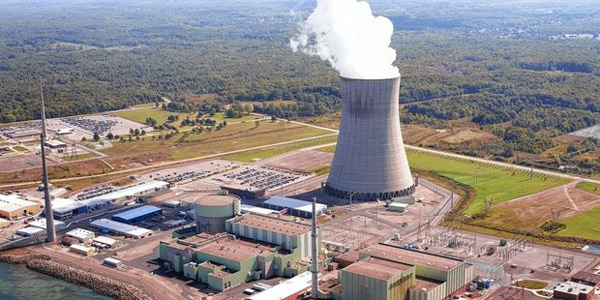By Michael Kuser
A federal judge on Tuesday dismissed all claims in a suit against New York’s zero-emissions credit program, the second such victory for state nuclear subsidies after a complaint over the Illinois ZEC program was thrown out July 14.
Judge Valerie Caproni of the U.S. District Court for the Southern District of New York granted motions to dismiss the case from the Public Service Commission, the defendant, and intervenor Exelon, owner of the three New York nuclear plants that would receive ZEC payments (16-CV-8164).
“Although no individual state can reverse the trend all by itself, New York and many other states have decided that they will do their part to reduce the emissions that contribute to global warming,” Caproni said. “The issue in this case is whether the method New York has chosen to facilitate its doing so is constitutional. … The court concludes that the New York [ZEC] program is constitutional.”
Her 47-page decision rejected every one of the plaintiffs’ arguments, including claims that the program intruded on FERC’s authority to regulate wholesale prices, and that New York violated the Constitution’s dormant Commerce Clause by favoring in-state generators.
The Electric Power Supply Association (EPSA), which filed the New York challenge with several members, said it will appeal the ruling. “We’ll continue to fight these nuclear bailouts, which cost ratepayers billions, crowd out investments in true renewables, and distort and could eventually destroy the established wholesale power markets,” said David Gaier, spokesman for EPSA member NRG Energy. On July 17, EPSA and its members appealed the dismissal of the Illinois suit to the 7th U.S. Circuit Court of Appeals. (See Illinois Zero-Emission Credit Suit Dismissed.)
Affirmation of CES
Gov. Andrew Cuomo praised Tuesday’s ruling in a statement: “The court forcefully ruled that the Clean Energy Standard (CES) and its zero-emissions credit program are valid tools to use to combat climate change. At a time when the federal government has abdicated its leadership on climate change, New York will continue to do all that we can to ensure that current and future generations have a clean and safe environment in which to live and prosper.”
The ZEC program, initiated as part of the CES last August, requires utilities in New York to procure ZECs that are generated by Exelon’s three in-state nuclear power plants. The PSC claimed that the program helps avoid the closure of the upstate nuclear plants, which the state needs to meet its goal of reducing carbon emissions and having 50% of energy produced by renewable resources by 2030.

Nine Mile Point Nuclear Plant | Constellation Energy Nuclear Group
EPSA, and members Dynegy, Eastern Generation and NRG Energy, joined Roseton Generating and Selkirk CoGen Partners in arguing they would lose millions because the subsidized nuclear plants would suppress capacity and energy prices.
Caproni used colorful language to frame her decision, citing President Trump’s description of climate change as a “hoax” and paraphrasing a famous line from “Romeo and Juliet”: “A rose by any other name still smells as sweet.”
On the plaintiffs’ argument that the ZEC program is directly tied to NYISO’s wholesale markets, Caproni said: “This argument is no more than an attempt to fashion a ‘tether’ by jamming a square peg into a round hole; plaintiffs’ argument rewrites the CES order. The CES order itself does not require the nuclear generators to sell into the NYISO auction.”
The Illinois and New York decisions are the latest in a string of federal court cases testing the boundaries between state and federal jurisdiction over electricity markets.
“Under current law, states have broad authority to advance a cleaner electric grid,” said Ari Peskoe, senior fellow in electricity law at Harvard Law School, who tracks constitutional challenges to state energy policies. “If courts rule against the states on appeal, their decisions might limit the scope of future state clean energy programs.”



